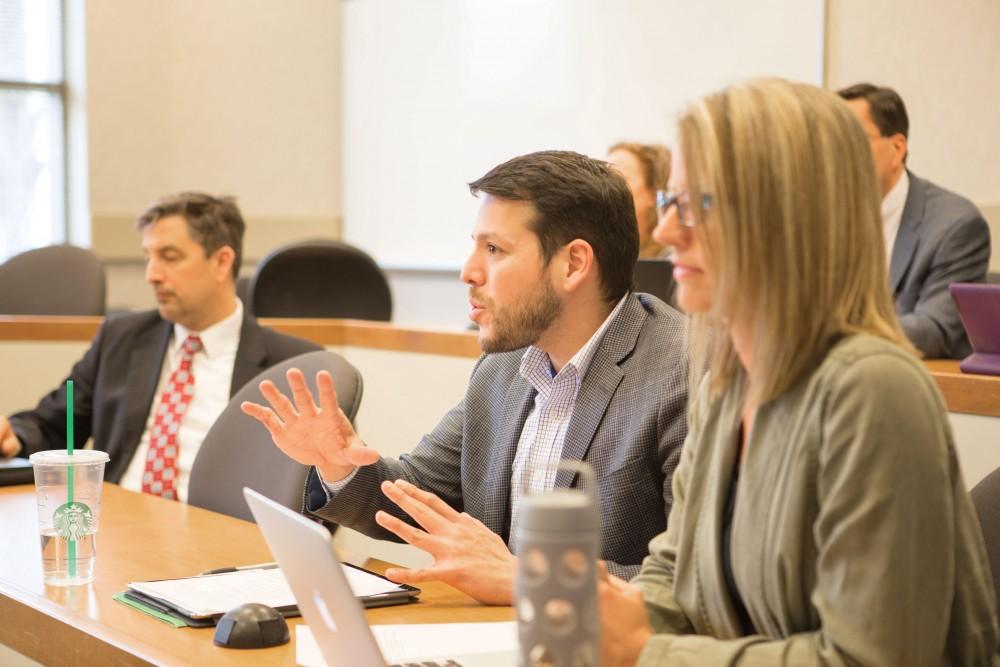GVSU to review sexual assault policies after Department of Education revokes Obama-era regulations

GVL / Sara Carte – Grand Valley faculty, Dr. Jesse M. Bernal, speaks at the UAS meeting in the DeVos Campus on Friday, Apr. 8, 2016.
Oct 9, 2017
The U.S. Department of Education announced in September that there were going to be some revisions to the Obama-era regulations for sexual assault policies on college campuses. Betsy DeVos, secretary of education, voiced that the handling of reported sexual assaults favored the alleged victim without the presentation of sufficient evidence, which too often resulted in an unfair determination.
Theresa Rowland, the Title IX coordinator and equity officer at Grand Valley State University, said representatives of the Division of Inclusion and Equity immediately began to discuss the implications of DeVos’ changes on GVSU’s current policy.
“Concerns around the 2011 guidance were noted earlier in September, so it was widely suspected that changes would be forthcoming,” she said via email. “We quickly convened those involved in Title IX reports to review the interim Q&A.”
Currently, the interim Q&A gives universities the choice between utilizing preponderance of the evidence and clear and convincing evidence standards. However, DeVos has not definitively stated the flexibility of the revisions, whether campuses will be forced to adopt the clear and convincing evidence standard in the future, or whether they will be given the option to decide.
Jesse Bernal, vice president for inclusion and equity at GVSU, said the university operates under the preponderance of the evidence standard and that it has worked well in the GVSU community. He distinguished between the preponderance of the evidence standard and the clear and convincing evidence standard that Betsy DeVos is proposing that university campuses adopt.
“The preponderance of the evidence standard is slightly above a 50 percent threshold that there’s been a violation of policy,” Bernal said. “In most cases, it means ‘more likely than not.’ The clear and convincing evidence standard means the violation is substantially more likely than not, but it’s not as absolute as the ‘beyond a reasonable doubt’ standard of the criminal justice system.”
When asked if there have been complaints about GVSU’s policy, Bernal noted that there will always be someone, in any given report of sexual assault, who will be unhappy with the outcome. GVSU recognizes that fact and strives to be fair in all of their investigations.
“Going through an investigation is a difficult experience for everyone involved, particularly for someone who has been a victim or survivor of sexual misconduct,” Bernal said. “We aim to support our student who has had a negative experience while also ensuring that we do our due diligence to uphold due process for everyone involved and are equitable in that process, both when someone is reported and when someone gives us a report of sexual misconduct or harassment.”
Since the preponderance of the evidence standard set by the Obama administration in 2011, there has been a national rise in the number of assaults reported, and women continue to report in greater numbers. Rowland said GVSU is in alignment with this national statistic.
“We continue to encourage reporting,” she said. “The university takes campus safety and federal guidelines very seriously.”
On the Division of Inclusion and Equity website, GVSU administration states its response to DeVos’ proposed revisions, writing that the only changes the university plans to adopt moving forward are crafting a more detailed letter for the respondent and removing the 60-day time limit on investigations. However, Bernal noted that GVSU administration will not move forward on a decision without the input of the campus community.
“There’s a statement on our website that we will be sending out in our newsletter to the campus next week,” Bernal said. “We want the community to share feedback with us. What should our evidentiary standard be? What should our timeline look like in terms of completing an investigation? We want to hear from folks before we go forward.”

























